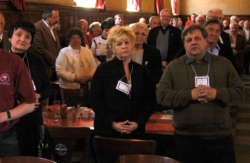Cardinal briefs deacons on initiatives at convocation
BRIGHTON -- Cardinal Seán P. O’Malley updated permanent deacons on his plans for three major initiatives in the archdiocese in the coming year at their annual convocation held March 24 at St. John’s Seminary.
The first new program is the rollout of the Renew curriculum throughout the archdiocese, the cardinal said. Renew is a three-year adult faith formation program used in other parts of the country, but will be tailored for the needs of the Boston Archdiocese. Here the program will pay special attention to healing wounds left from the priest abuse scandal.
By educating Catholics in their faith, the Church will better prepare them to resist the attacks and attempts to have the Church defined by its opponents, he said.
The program will be available in all of the languages spoken in the archdiocese, he said.
The cardinal said he learned about the program and was impressed by the success of Renew at The Catholic University of America in Washington, D.C., where he taught and is now on the board of directors.
His experiences at CUA convinced the cardinal that Renew will be vital to campus ministries, he said. “There are 250,000 university students in Boston. We really hope this is a chance to evangelize and reach out to them.”
It is critical to reach out to adolescents and young adults, he said. “We must mentor them in the faith and inspire them to discipleship.”
The deacons will play a vital role in bringing Renew into local communities, he said. “We will depend on the deacons and other leaders in the parishes. We are anxious for the deacons and their wives to contribute.”
The cardinal said he hopes Renew will bring inactive Catholics back to the Church.
The second priority for the next year is to reverse the damage done to the sacrament and institution of marriage by popular culture and politicians trying to define it, he said.
“There has been a 60 percent decrease in marriages nationwide,” he said. “And I am sure we here in Boston are out in front -- we’re on the cutting edge on un-marriage.”
The crisis in marriage stems from the shift in the popular perception of its role in society, he said. “We are moving away from child-centered marriage to an arrangement between adults.”
Because so many deacons are living a married life as a vocation, they are in a privileged position to speak out for married life and share its virtues with other Catholics, he said.
The cardinal said he appointed a committee to examine the state of marriage and March 23 he received their report with detailed recommendations, especially on marriage preparation, that he will share and discuss in the coming weeks.
“I am very pleased with the hard work and ideas from that committee. They came up with wonderful ideas I look forward to sharing with you,” he said.
The third priority is the need for pastoral planning, he said. As the number of priests decreases, the archdiocese needs to prepare for greater roles for deacons and laity.
The cardinal said he has commissioned a study of the situation and will bring the deacons into the discussion when it is complete.
“The involvement of all of you is so important,” he said.
Responding to a question from the audience, the cardinal took the opportunity to review the archdiocesan finances.
“Today, the situation is better,” he said.
“I joked with the friars when I came here that I thought I knew the definition of poverty was to own nothing. Now, I understand poverty is owing hundreds of millions of dollars.”
The cardinal said the archdiocese has settled 600 cases from the priest abuse scandal with the proceeds from the sale of property and other assets and insurance.
The archdiocese has endowed St. John’s Seminary, turned around the Catholic hospitals so they are eligible to join a national alliance of Catholic hospitals, and shored up pension funds for the clergy and lay workers.
The cardinal said he remained committed to transparency and will continue to publish a complete financial report.



















